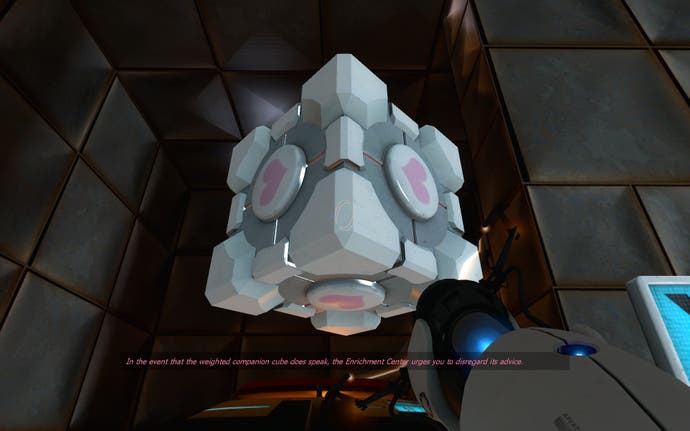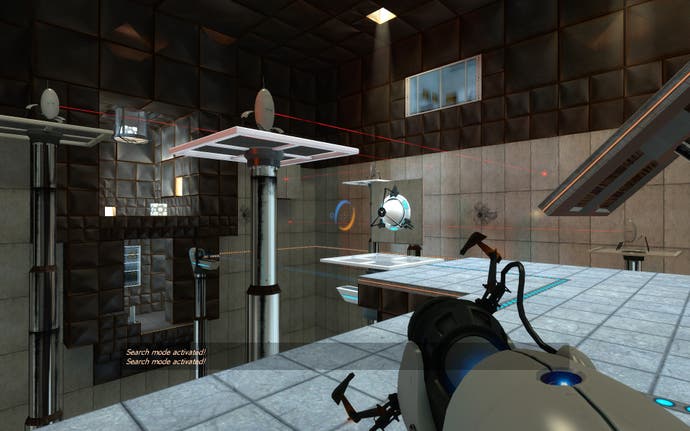Portal
Holy!
As the game reaches its apex, the scripted feel of the earlier levels is ousted in favour of something closer to a Half-Life episode. Its conclusion is funny, original and extremely memorable, as you dismantle the game's very personality and achieve a manner of revenge. Gabe Newell was right when he said it was Valve's best to date.
As a component part of an admirably vast whole, Orange Box, Portal gets away with its brevity - first-time completion rates of less than three hours will be the norm for FPS devotees - and in doing so comes close to that increasingly likely gaming future: single-sitting, film-length entertainment experiences. It's closer to the episodic ideal than Valve's own Half-Life episodes have proven thus far. Beyond the main narrative single-player mode, you're invited to gun for achievements - certainly present in the PC and 360 builds, both of which we've completed - and tackle advanced levels and 'challenge' versions.
'Advanced' tours through the latter six test chamber scenarios with seemingly vital elements removed, or conditions skewed to enhance the difficulty. The Weighted Cube becomes a bouncy ball, while other solutions, dependent on the flinging concept, do away with charitable portal surfaces, forcing you to leverage every second of a pliable surface's exposure, laying down exits during feats of acrobatics with the precision of a traditional twitch-killer. One of the best advanced levels is the adaptation of a mid-game scenario built primarily around sentry guns, this time encasing them in indestructible cages, forcing you to build your strategy around evasion rather than confrontation for the second attempt. More of this, in the form of downloadable content, will be welcome.

Elsewhere, 'Challenge' mode imposes other conditions - using the fewest number of portals, the least possible number of steps (effectively the opposite of the least-portals goal), or achieving the solution in the shortest amount of time. More than simply space-fillers, the challenge levels help drive you toward new patterns of play, revisiting levels with a view to reduce them to the purest, simplest solution. You'll tear your hair out in places, but bending the rules of the already thoroughly bent portal gun rulebook is worth the aggravation.
Beyond that, it should be said, there is almost nothing frustrating or poorly conceived in Portal's design - an astonishing achievement given the degree to which the portal gun reshapes the movement potential of a player. Listening to the (once again extremely revealing) developer commentary, with contributions from developers like Kim Swift, Robin Walker and even GLaDOS actress Ellen McLain, the degree to which tester feedback informed level design, and the level of purpose invested in every nook, crate and glass partition, is laid bare.
There's common sense (portals never kill you - if you're in one and it closes, you're simply pushed back into the world) as well as uncommon sense (observation rooms represented as frosted glass windows with desks and chairs behind them are not just a G-Man-style narrative indulgence - they give Valve another light source to play with, allowing them to direct your attention to certain areas) and pleasant inferences to draw (the GLaDOS humour is often used at junctions where it's necessary to keep you still long enough to witness something instructive). At times, it's as fascinating to observe Valve's attention to detail in action, as it is satisfying to nail the solution to a puzzle.

Nevertheless, it's hard not to return to the fact that it's all over so soon, and, with so few puzzles actually to tackle once you're in your stride, not feel slightly let down. Some of the better concepts - using portals to manipulate rockets fired by sentry turrets into offensive weapons - are scarcely used, and the vaunted link between Aperture Science and the world of the Half-Life games is less dramatic than we had hoped.
More will undoubtedly follow, of course - as Gabe Newell remarks at the outset of the developer commentary, Valve feels it is only touching the surface of the portal mechanic's potential - and so we have that to look forward to, and the rest of The Orange Box to enjoy in the meantime. We've had potential before, though, with student game Narbacular Drop, Portal's predecessor, and this was meant to deliver on it. And so we're left with a curious contradiction: one of the most interesting and delightful things Valve's ever done, but also one of its least fulfilling. If only we had our own portal gun to bridge the gap to the first infusion of new content, perhaps we could forget it. Either that, or the next best thing - Companion Cube plush toys. It's surely only a matter of time.
